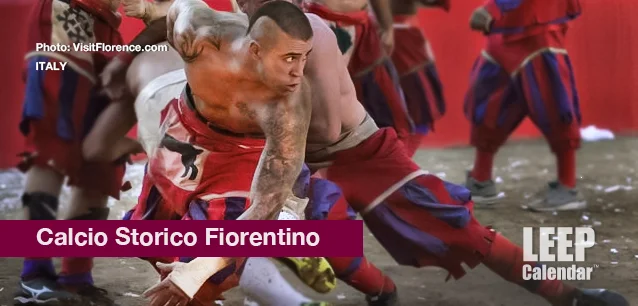 AD
AD
Today is: November 23
Scroll to explore events active on this date.
LEEP INK FEATURES

August? Absolutely!
In August, we live through the Dog Days of Summer. It's hot and often humid, and those who can leave for better climates do. Down south, winter is in full force. August is also known as "the ...

In The Heat of July: July 2025 Events
Is it hot enough (or cold enough if you're below the equator) for you yet? There is actually a day for that! Like every month, I pick a diverse collection of events you may or may not know about. This ...

May Blooms: Events in May 2025
Along with October, May is one of the most densely packed months of the year. It's before the summer humidity and the last whole month of the school year. The weather is warming in t...
About the Calcio Storico Fiorentino
European Countries
Ends: Jun 24, 2024
DESCRIPTION:
The Calcio Storico Fiorentino, often called Calcio Fiorentino, can be considered sport's answer to anger management. This traditional sport of Florence, Italy, dates back to the 16th century and combines soccer, rugby, and wrestling in an exciting, violent, and vibrant spectacle. It originated from the Roman sport of harpastum, which Roman generals used to keep legionnaires fit and in top fighting condition beginning in 59 BC.
The game is played in the Piazza Santa Croce, on a field of sand, twice a year in June as part of the San Giovanni celebrations, honoring St. John the Baptist, the city's patron saint. Four teams represent the four quarters of the city: Santa Croce (Blue), Santo Spirito (White), Santa Maria Novella (Red), and San Giovanni (Green). Each team comprises 27 players.
Once the players are on the field, a historic cannon fires to begin the match. The game's objective is to throw the ball over a designated spot on the opponent's side of the field. Players employ a free-for-all strategy of violence and technique, using any means necessary to achieve victory. A lack of rules leads to extreme scrambling, pushing, and tackling that would be considered illegal in most modern contact sports.
The most famous game was held in 1530 during the siege of Florence, seen as an act of defiance against the attacking forces.
Today, Calcio Storico Fiorentino is a source of immense local pride. The annual games draw large crowds, including a parade of participants dressed in historical costumes. The tournament winners are awarded a white calf, keeping with centuries of tradition.
PLEASE NOTE:
Treat all televised and venue-specific events (sporting, concerts, trade shows, etc.) as estimated. Several factors can cause an event to move dates at the last minute, including weather, strikes, natural disasters, political upheaval, conflicting programming, pandemics, and current events. Because of this, always verify the event with the promotor before committing resources. LEEP often estimates dates based on the previous year's schedules, as the final dates are only a few months, weeks, or days before the event. If the date is known to be estimated, you will see an (est) following the date in the title.
VIDEOS
SUPPORTING DOCUMENTS
Currently, this event does not have supporting documents.
ADDITIONAL IMAGES
Currently, this event does not have supporting images.
Where would you like to go now?
 AD
AD


/footer-logo.svg)
